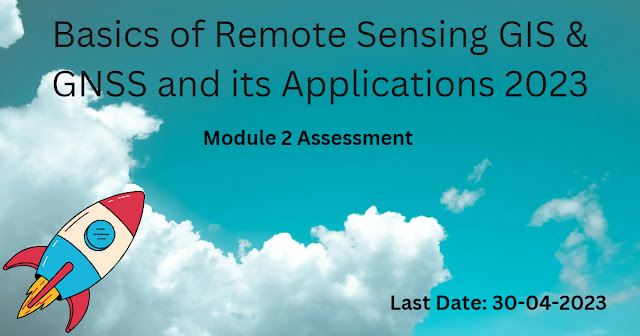Hey Folks, We Came back with Basics of Remote Sensing GIS & GNSS AICTE Course Answers. In this Course we are going to see about the answers of module 2 assessment. I hope this assignment will help you to solve all the answers.
Then y waiting Come with us to know more about this until the Last.
About AICTE
AICTE stands for All India Council for Technical Education. It is a national-level council in India responsible for the planning, coordination, and development of technical education in the country.AICTE was established in 1945 as an advisory body for technical education under the Department of Education, Government of India. In 1987, it was granted statutory status by an Act of Parliament, and since then, it has been the primary regulator for technical education in India.
AICTE's responsibilities include formulating policies and guidelines for technical education institutions, promoting research and development in technical education, providing grants and financial assistance to institutions, ensuring quality assurance through accreditation, and collaborating with other national and international organizations for the development of technical education.
AICTE has played a significant role in the development of technical education in India, and it has contributed to the growth of the country's economy by producing a skilled workforce in various fields of engineering and technology.
Basics of Remote Sensing GIS & GNSS and its Applications 2023
Q1. GPS navigation message has
a. 5 subframes
b. 50 subframes
c. 500 Subframes
d. None
Answer: [ a ] 5 subframes
Q2. PDOP gives level of confidence for accuracy in:
a. X, Y, Z, T
b. X,Y, Z
c. X, Y
d. None of the Above
Answer: [ b ] X,Y, Z
Q3. RINEX stands for
a. Receiver internal expert
b. Receiver independent exchange
c. Receiver intra exchange
d. receiver intra expo service
Answer: [ b ] Receiver independent exchange
Q4. The data rate of GPS navigation message is
a. 40Hz
b. 50Hz
c. 500Hz
d. 5Hz
Answer: [ b ] 50 Hz
Q5. RINEX consists of
a. Observation file
b. Navigation file
c. Metrological file
d. all of the options
Answer: [ d ]
Q6. Which of following is adopted by GLONASS
a. CDMA
b. TDMA
c. FDMA
d. Both CDMA and FDMA
Answer: [ C ] FDMA
Q7. Which of the following system has the same signal transmission for anti-nodal satellites
a. IRNSS
b. GPS
c. Compass
d. GLONASS
Answer: [ d ] GLONASS
Q8. PDA stands for:
a. Personal data assistant
b. Power distribution assembly
c. Personal digital assistant
d. Process data acquisition
Answer: [ C ] Personal digital assistant
Q9. GDOP gives level of confidence for accuracy in:
a. X, Y, Z, T
b. X,Y, Z
c. X, Y
d. None of the Above
Answer: [ b ] X,Y, Z
Q10. PDOP stands for:
a. Position dilution of precision
b. Provisional department of planning
c. Professional development online production
d. Precision dilution of position
Answer: [ a ] Position dilution of precision
Q11. IGS stands
a. Internal Geographic system
b. International GNSS services
c. International geographic system
d. intra GPS systems
Answer: [ b ] International GNSS services
Q12. Position of GPS satellites is present in
a. Observation file
b. Navigation file
c. Metrological file
d. none of the options
Answer: [ b ] Navigation file
Q13. Receiver clock errors can be eliminated by
a. Single difference
b. double difference
c. Triple difference
d. None
Answer: [ b] double difference
Q14. GDOP stands for
a. Gravitational dilution of precision
b. Geometrical dilution of precision
c. Geomorphological dilution of precision
d. Geographical Dilution of Precision
Answer: [ b ]
Q15. Department in India planned to develop Indian GPS system:
a. Department of Defense
b. Department of Space
c. Department of Science and Technology
d. Defense Research and Development Organization
Answer: [ b ]
Q16. PDOP gives level of confidence for accuracy in:
a. X, Y, Z, T
b. X,Y, Z
c. X, Y
d. None of the Above
Answer: [ b ]
Conclusion
If any change in answers, please let me know. Visit on the Last date for any change in the answers.

